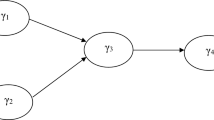Abstract
Generalized Structured Component Analysis (GSCA) represents component-based structural equation modeling. Currently, GSCA is geared only for the analysis of quantitative data. In this paper, GSCA is extended to deal with qualitative data through data transformation. In particular, the optimal scaling approach is adopted for data transformation as it can be readily coupled with the GSCA estimation procedure. An alternating least-squares algorithm is developed that involves two phases for estimation of model and data parameters. Two empirical applications are presented to demonstrate the usefulness of the proposed method.
Similar content being viewed by others
References
Bock, R.D. (1960). Methods and applications of optimal scaling. Psychometric Laboratory Report #25, University of North Carolina.
de Leeuw, J., Young, F.W., & Takane, Y. (1976). Additive structure in qualitative data: An alternating least squares method with optimal scaling features. Psychometrika, 41, 471–503.
Efron, B. (1982). The Jackknife, The Bootstrap and Other Resampling Plans. Philadelphia: SIAM.
Gifi, A. (1990). Nonlinear Multivariate Analysis. Chichester: Wiley.
Hwang, H. (2009a). Regularized generalized structured component analysis. Psychometrika, 74, 517–530.
Hwang, H. (2009b). GeSCA. Available at http://www.sem-gesca.org.
Hwang, H., & Takane, Y. (2004). Generalized structured component analysis. Psychometrika, 69, 81–99.
Hwang, H., DeSarbo, S.W., & Takane, Y. (2007). Fuzzy clusterwise generalized structured component analysis. Psychometrika, 72, 181–198.
Hwang, H., Ho, M.-H., & Lee, J. (2009). Generalized structured component analysis with latent interactions. Paper submitted for publication.
Hwang, H., Malhotra, N.K., Kim, Y., Tomiuk, M.A., & Hong, S. (in press). A comparative study on parameter recovery of three approaches to structural equation modeling. Journal of Marketing Research.
Hwang, H., Takane, Y., & Malhotra, N.K. (2007). Multilevel generalized structured component analysis. Behaviormetrika, 34, 95–109.
Kempler, B. (1971). Stimulus correlates of area judgements: A psychophysiological developmental study. Developmental Psychology, 4, 158–163.
Kruskal, J.B. (1964). Multidimensional scaling by optimizing goodness of fit to a nonmetric hypothesis. Psychometrika, 29, 1–27.
Micceri, T. (1989). The unicorn, the normal curve and other improbable creatures. Psychological Bulletin, 105, 156–166.
Takane, Y., & Hwang, H. (2005). An extended redundancy analysis and its applications to two practical examples. Computational Statistics and Data Analysis, 49, 785–808.
Takane, Y., Young, F.W., & de Leeuw, J. (1980). An individual differences additive model: An alternating least squares method with optimal scaling features. Psychometrika, 45, 183–209.
Tenenhaus, M. (2008). Component-based structural equation modelling. Total Quality Management & Business Excellence, 19, 871–886.
Young, F.W. (1981). Quantitative analysis of qualitative data. Psychometrika, 46, 357–388.
Author information
Authors and Affiliations
Corresponding author
About this article
Cite this article
Hwang, H., Takane, Y. Nonlinear Generalized Structured Component Analysis. Behaviormetrika 37, 1–14 (2010). https://doi.org/10.2333/bhmk.37.1
Received:
Revised:
Published:
Issue Date:
DOI: https://doi.org/10.2333/bhmk.37.1




